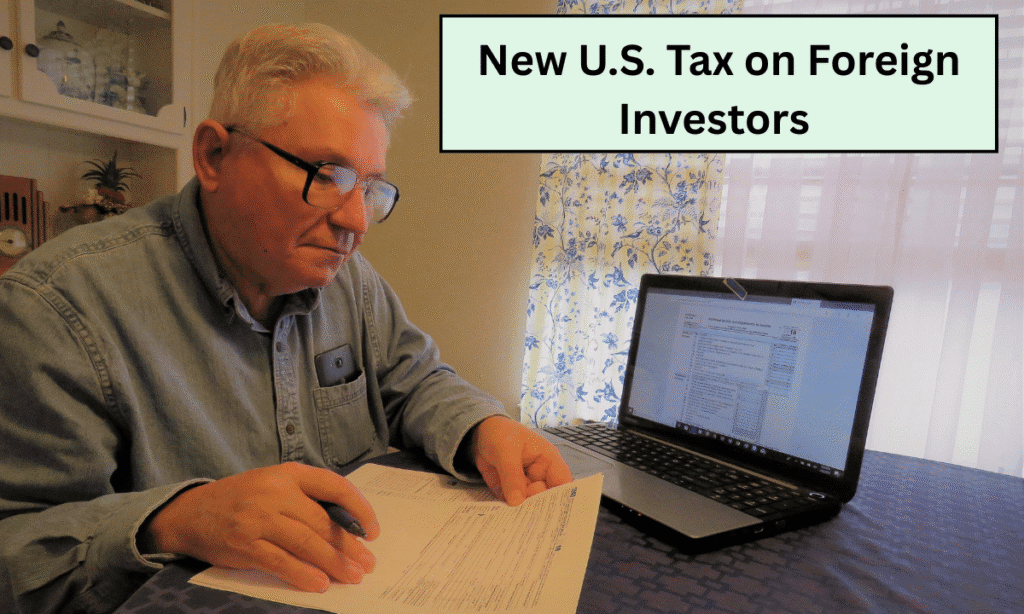A new tax rule buried in the U.S. budget bill could reshape foreign investment—and shake up Wall Street.
🧐 What’s Happening?
The U.S. government has introduced a foreign investor tax as part of a recent budget bill, which could significantly impact global investors and companies doing business with America. This move—quietly embedded in the legislative text—grants U.S. authorities the power to impose up to a 20% tax on passive income, such as dividends and royalties, earned by investors from countries seen as “unfair” or “discriminatory” toward the U.S. in tax matters.
This is no minor tweak—it’s a potential game-changer for how global capital flows into American markets.

🔍 Breaking Down the Law: What Is Section 899?
The change is part of a provision known as Section 899, a clause tucked inside what has been dubbed Trump’s One, Big, Beautiful Bill.
Here’s what Section 899 allows the U.S. to do:
- Impose retaliatory taxes on countries with tax regimes considered discriminatory to U.S. businesses and investors.
- Target individuals and companies—even if they’re just passive investors in U.S. equities or bonds.
- Label certain jurisdictions as Discriminatory Foreign Countries (DFCs), thus subjecting their residents and businesses to these new tax measures.
If you’re a company or investor from a DFC, you’re on the hook for this new foreign tax.
🌍 Who Could Be Affected?
The reach of this legislation is wide and could hit multiple groups:
1. Foreign Individuals Investing in the U.S.
If you’re a non-U.S. citizen investing in American stocks or corporate bonds, and your country is considered a DFC, you may now face a steep 20% tax on your investment returns.
2. International Corporations
Multinational companies with U.S. operations—or those holding U.S. assets—could face additional tax burdens.
3. U.S. Companies with Foreign Owners
Even American companies could feel the pinch if their foreign stakeholders are from the targeted countries.
💸 What’s the Real-World Impact?
Short-Term Effects Already Showing:
- Sell-off in U.S. Treasuries: Investors are already pulling back. A recent surge in U.S. bond yields shows declining confidence.
- Dollar Weakness: The U.S. dollar has dropped roughly 8% this year, with the Dollar Index dipping below 100.
- Capital Flight Risk: There’s a visible cooling of foreign capital into U.S. equities and bonds.
Long-Term Concerns:
“This isn’t just bad timing—it’s strategic self-harm,” says Nigel Green, CEO of deVere Group.
Here’s why this matters:
- Foreign Direct Investment (FDI) could decline, hurting job creation and economic growth.
- Market volatility could increase as global investors hedge against legal uncertainty.
- The U.S. deficit could worsen as foreign capital becomes scarcer—right when the government needs it most.
🧠 Fresh Insights: What This Means for Global Investors
1. Reassess Your U.S. Holdings
Global investors should evaluate their exposure to American markets, particularly if they reside in a country that could be labeled as a DFC.
2. Explore Alternative Investment Destinations
Emerging markets in Southeast Asia, Africa, or even European assets may look more attractive as U.S. policy becomes less predictable.
3. Watch for Retaliation
History shows that aggressive tax policies often trigger tit-for-tat responses. Other countries could respond with similar tax barriers, creating a fragmented and volatile global investment environment.
🔄 Why Now? Timing Couldn’t Be Worse
The U.S. economy is already under pressure:
- Rising interest rates are squeezing both consumers and businesses.
- The federal deficit is ballooning.
- Global investors are cautious, seeking safer, stable opportunities.
Introducing a tax that discourages foreign capital right now risks choking the very financial lifeline the U.S. economy depends on.
📊 Quick Recap: Key Takeaways
| Key Change | Impact |
|---|---|
| Section 899 (New Tax Rule) | Up to 20% tax on foreign passive income from certain countries |
| Target Audience | Individuals, corporations, U.S.-based firms with foreign ownership |
| Market Reaction | Bond sell-off, weaker dollar, cooling foreign equity inflows |
| Risks | Reduced foreign investment, increased volatility, possible retaliation |
🧾 Final Thoughts: What Should You Do?
Whether you’re a global investor, multinational firm, or policy analyst, this development deserves your attention. The new tax framework under Section 899 is more than a fiscal adjustment—it’s a strategic pivot in how America handles global capital.
In an increasingly interconnected world, such moves ripple fast and far. If uncertainty grows, expect investors to take their capital elsewhere.
Stay informed, diversify smartly, and don’t ignore the fine print.
❓FAQs
Q1: Does this tax apply to all foreign investors?
No. It specifically targets investors from countries labeled as having “discriminatory” tax practices against the U.S.
Q2: What counts as passive income under this law?
Passive income includes dividends, royalties, and possibly interest—income earned without active involvement in the business.
Q3: When does this tax come into effect?
While exact timelines depend on further legislation, the bill has already been approved by the U.S. House of Representatives, making implementation highly likely.